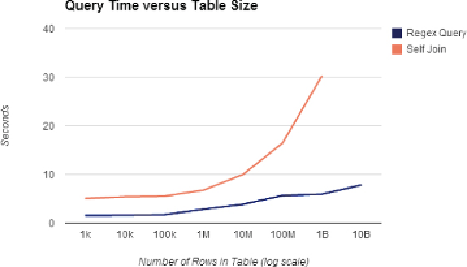Database Reference
In-Depth Information
longer than you're willing to wait. Multiterabyte queries are fairly common;
multipetabyte queries are not.
Performance Benchmarks
Google doesn't publish benchmarks against BigQuery because when a
company publishes its own benchmarks, people have a tendency to not
believe them. In addition, if Google published performance numbers, it
could be construed as a promise that users will see similar numbers. Because
there seemed to be a lack of available performance information, we decided
to run a simple benchmark of our own.
Figure 2.1
shows a graph of how
query execution time varies with the number of rows processed in a table for
two different queries.
Figure 2.1
Query execution time versus table size
The benchmark used a real dataset: daily page views for Wikipedia in 2011.
Each run of the benchmark used a sampled set of rows from the underlying
dataset and increased by roughly an order of magnitude in size. The smallest
table was 1,192 rows; the largest was more than 10 billion rows. The tables
are in a publicly available dataset:
bigquery-samples:wikipedia_benchmark
. You should be able to
reproduce similar results on your own (although you should note that
several of the tables are large, and it can be easy to run up a serious bill by
querying them).
The lower line on the chart corresponds to timings for a simple query that
does a regular expression over the title field, groups by the language field,

